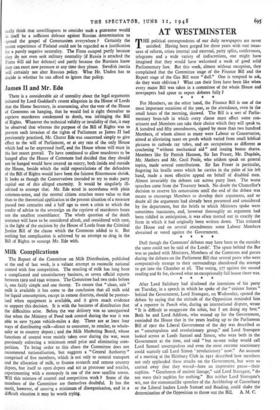James II and Mr. Ede
There is a considerable air of unreality about the legal arguments
initiated by Lord Goddard's recent allegation in the House of Lords that the Home Secretary, in announcing, after the vote of the House
of Commons on hanging, that he would feel it right thereafter to reprieve murderers condemned to death, was infringing the Bill of Rights. Whatever the technical validity or invalidity of that, it may be observed that whereas the purpose of the Bill of Rights was to prevent such invasion of the rights of Parliament as James II had persistently practised, Mr. Chuter Ede was concerned simply to give effect to the will of Parliament, or at any rate of the only House which had so far expressed itself, and the House whose will must in the last resort prevail. To have continued to allow murderers to be hanged after the House of Commons had decided that they should not be hanged would have created an outcry, both inside and outside the House, beside which the mild expostulations of the defenders of the Bill of Rights would have been the faintest flittermouse shriek. It looks as though the Conservatives intended to try to make party capital out of this alleged enormity. It would be singularly ill- advised to attempt that. Mr. Ede acted in accordance with plain common-sense, and the normal citizen attaches more value to that than to the theoretical application to the present situation of a measure passed two centuries and a half ago to meet a crisis to which the tender of advice to the sovereign on the reprieve of murderers bears not the smallest resemblance. The whole question of the death sentence will have to be considered afresh, and considered with care, in the light of the excision by the House of Lords from the Criminal Justice Bill of the clause which the Commons added to it. But nothing but complication is achieved by an attempt to drag in the Bill of Rights to scourge Mr. Ede with.






























 Previous page
Previous page